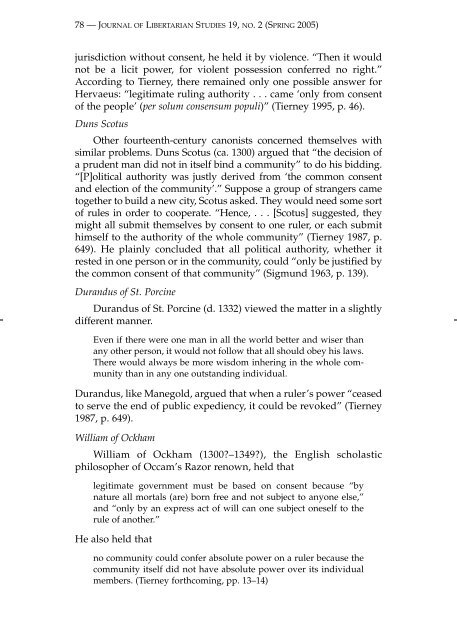Quod Omnes Tangit
Quod Omnes Tangit
Quod Omnes Tangit
Create successful ePaper yourself
Turn your PDF publications into a flip-book with our unique Google optimized e-Paper software.
78 — JOURNAL OF LIBERTARIAN STUDIES 19, NO. 2 (SPRING 2005)<br />
jurisdiction without consent, he held it by violence. “Then it would<br />
not be a licit power, for violent possession conferred no right.”<br />
According to Tierney, there remained only one possible answer for<br />
Hervaeus: “legitimate ruling authority . . . came ‘only from consent<br />
of the people’ (per solum consensum populi)” (Tierney 1995, p. 46).<br />
Duns Scotus<br />
Other fourteenth-century canonists concerned themselves with<br />
similar problems. Duns Scotus (ca. 1300) argued that “the decision of<br />
a prudent man did not in itself bind a community” to do his bidding.<br />
“[P]olitical authority was justly derived from ‘the common consent<br />
and election of the community’.” Suppose a group of strangers came<br />
together to build a new city, Scotus asked. They would need some sort<br />
of rules in order to cooperate. “Hence, . . . [Scotus] suggested, they<br />
might all submit themselves by consent to one ruler, or each submit<br />
himself to the authority of the whole community” (Tierney 1987, p.<br />
649). He plainly concluded that all political authority, whether it<br />
rested in one person or in the community, could “only be justified by<br />
the common consent of that community” (Sigmund 1963, p. 139).<br />
Durandus of St. Porcine<br />
Durandus of St. Porcine (d. 1332) viewed the matter in a slightly<br />
different manner.<br />
Even if there were one man in all the world better and wiser than<br />
any other person, it would not follow that all should obey his laws.<br />
There would always be more wisdom inhering in the whole community<br />
than in any one outstanding individual.<br />
Durandus, like Manegold, argued that when a ruler’s power “ceased<br />
to serve the end of public expediency, it could be revoked” (Tierney<br />
1987, p. 649).<br />
William of Ockham<br />
William of Ockham (1300?–1349?), the English scholastic<br />
philosopher of Occam’s Razor renown, held that<br />
legitimate government must be based on consent because “by<br />
nature all mortals (are) born free and not subject to anyone else,”<br />
and “only by an express act of will can one subject oneself to the<br />
rule of another.”<br />
He also held that<br />
no community could confer absolute power on a ruler because the<br />
community itself did not have absolute power over its individual<br />
members. (Tierney forthcoming, pp. 13–14)
















